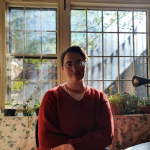Feats of Strength
I am freshly vaccinated against coronavirus and attending a goth/industrial dance in the Catskills region of New York, during the calm before the Delta Variant. There are two on-stage performers, each single bodies with band-like names, and a DJ who will spin the most rhythmic expressions of horror and Todesangst. I am there to show support for my friend E., one of the performers. Also present for their sake: M., E.’s current romantic allegiance, and Z., a young woman I met through E. We are a transfeminine clique, two they/thems and two she/theys. It has been a year since I first came out, and this is, in a sense, my first outing.
The venue: Somehow a 1970s tiki bar was grafted onto a Korean restaurant, and together they spawned a gender-diverse performance space on the side. We have to walk through the bar on the way to the entrance of the venue, through a cloud of squinting boomers trying to figure out what we are. The skinhead stamping entry in exchange for $7 seems oddly solicitous, offers help with anything I might need. Later I notice he is hanging green and yellow hankies from his left pocket. Since I am not interested in paying to be pissed on, I see no need to ask him for anything further. I was wearing a red mask; perhaps he misinterpreted it as expressing interest in fisting.
It has been over twenty years since my last attendance at a show like this. For two reasons. First: early in my relationship with my former partner, we both mistakenly believed that, as much as possible, we had to do things as a couple. I feared that my existence was so charged with desire that if I ventured too often into settings from which she was absent I would never be able to keep myself aligned with her. I limited our separations to those mandated by political work, which I conceived with such rigidity as to be wholly uncontaminated by sex or its threat. And she hated this music, so why would she ever go to a show with me?
The second reason was that I did not own the right clothes, could not do the right makeup. Tonight I own the right clothes, and I have done the right makeup. I am getting better at the Siouxsie eyeliner, though on me the effect may always be more Robert Smith. My nail polish and lipstick advertise themselves as being wine colored, but in this setting that shade evokes blood. I am confident enough in my tits to wear nothing but a black camisole as my top, confident enough in the lighting not to worry about the week-old stubble on my chest. I just bought a new belt at my favorite consignment shop, black leather studded heavily with cowrie shells, red beads, and a single turquoise. Worn off center, the teeth of the cowries make my black denim cutoffs look sinister.
The other performer is younger than E., and some of the people in his entourage look like they might even still be in high school. I am also pretty sure they are all cisgender. Most of the guys on that side of the floor look like they got lost on their way to a Vampire Weekend concert. I am offended at how little effort they have put into their looks.
I did not know it was possible to slam dance affectionately until I saw E. and M. precisely calibrating the force of their impacts—soft enough to say, “I don’t want to hurt you,” but hard enough to warn that it’s a possibility. Midway through E.’s set, a bottled blonde wearing sandals and a sky-blue princess dress wanders in from the bar, takes a look at all of us and gets a look on her face that signifies that she is willing herself to think, “wow, this looks like fun!” She starts noodling her arms like a hippie at a Phish concert in the middle of the floor, impinging on M.’s hardcore steps.
During the outdoor smoke break, we sit in companionable silence until someone finds something kind to say about someone else. The first target of praise is E., who has expressed some doubts about their own tunefulness. I end up comparing their work to Christian Death.
We return to the dance floor, then go out to the bar. Somehow our bar table conversation turns into a friendly round robin tournament of arm wrestling. M. is indisputably the strongest, followed by E. I surprise myself by besting Z., and apologize to her profusely. I suspect each of us has bad childhood associations with feats of strength or relative lacks thereof. I do my best to counteract whatever humiliation she might feel.
We talk about coronavirus, and masks, and when to wear them and when not and what we like about them. M. says she likes that it hides her goofy smile. I say I like how they hide my grouchy scowl. Z. says she likes that they hide her face. “Stop it,” I blurt out. “Your face is gorgeous.” E. and M. add their praises. Z. points out that her mask bears a design that makes it look like she has amazing fangs, and we all concede that fangs are amazing.
We dance some more. Everyone is beautiful in the strobe lights.
Joseph-Kass Tomaras (they/she) is a writer and translator living in the Hudson Valley region of New York State. Their fictions and unfictions have appeared in Salvage, Lackington’s, and The Magazine of Fantasy & Science Fiction, among other places. She is currently working on translating a collection of short fiction by the Yiddish writer Der Nister. They blog occasionally at skinseller.blogspot.com and tweet somewhat more frequently as @epateur.


 BACK TO ISSUE
BACK TO ISSUE


